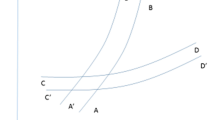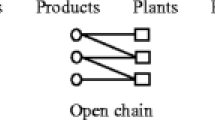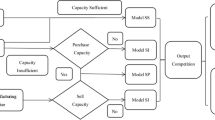Abstract
Semiconductor capacity planning is a cross-functional decision that requires coordination between the marketing and manufacturing divisions. We examine the main issues of a decentralized coordination scheme in a setting observed at a major US semiconductor manufacturer: marketing managers reserve capacity from manufacturing based on product demands, while attempting to maximize profit; manufacturing managers allocate capacity to competing marketing managers so as to minimize operating costs while ensuring efficient resource utilization. This cross-functional planning problem has two important characteristics: (i) both demands and capacity are subject to uncertainty; and (ii) all decision entities own private information while being self-interested. To study the issues of coordination we first formulate the local marketing and the manufacturing decision problem as separate stochastic programs. We then formulate a centralized stochastic programming model (JCA), which maximizes the firm's overall profit. JCA establishes a theoretical benchmark for performance, but is only achievable when all planning information is public. If local decision entities are to keep their planning information private, we submit that the best achievable coordination corresponds to an alternative stochastic model (DCA). We analyze the relationship and the theoretical gap between (JCA) and (DCA), thereby establishing the price of decentralization. Next, we examine two mechanisms that coordinate the marketing and manufacturing decisions to achieve (DCA) using different degrees of information exchange. Using insights from the Auxiliary Problem Principle (APP), we show that under both coordination mechanisms the divisional proposals converge to the global optimal solution of (DCA). We illustrate the theoretic insights using numerical examples as well as a real world case.
Similar content being viewed by others
References
Berman, O., Ganz, Z. and Wagner, J.M. (1994) A stochastic optimization model for planning capacity expansion in a service industry under uncertain demand. Naval Research Logistics, 41, 545–564.
Bienstock, D.and Shapiro, J.F.(1988) Optimizing resource acquisition decisions by stochastic programming. Management Science, 34(2), 215–229.
Burton, R.M. and Obel, B. (1980) The efficiency of the price, budget, and mixed approaches under varying a priori information levels for decentralized planning. Management Science, 26(4), 401–417.
Carpentier, P., Cohen, G. and Culioli, J.-V. (1996) Stochastic optimization of unit commitment: a new decomposition framework.IEEE Transactions on Power Systems, 11(2), 1067–1073.
Christensen, J.and Obel, B.(1978) Simulation of decentralized planning in two Danish organizations using linear programming decomposition.Management Science, 24(15), 1658–1667.
Cohen, G.(1978) Optimization by decomposition and coordination: a unified approach. IEEE Transactions on Automatic Control, AC-23(2), 222–232.
Cohen, G.and Miara, B.(1990) Optimization with an auxiliary constraint and decomposition. SIAM Journal on Control and Optimization, 28(1), 137–157.
Cohen, G.and Zhu, D.L.(1984) Decomposition coordination methods in large scale optimization problems: the nondifferentiable case and the use of augmented lagrangians, in Advances in Large Scale Systems Theory and Applications, Vol. 1, Cruz, J.B. (ed.), JAI Press, Greenwich, CT.
Culioli, J.-C. and Cohen G. (1990) Decomposition/coordination algorithms in stochastic optimization. SIAM Journal on Control and Optimization, 28(6), 1372–1403.
Dantzig, G.B. and Wolfe, P. (1961) The decomposition algorithm for linear programs. Econometrica, 29(4), 767–778.
Eppen, G.D., Martin, R.K. and Schrage, L. (1989) A scenario approach to capacity planning. Operations Research, 37(4), 517–527.
Ertogral, K.and Wu, S.D.(1999) Auction-theoretic coordination of production planning in the supply chain.Report No.99T-01.Department of Industrial and Manufacturing Systems Engineering, Lehigh University.
Escudero, L.F., Kamesam, P.V., King, A.J. and Wets, R.J.-B. (1993) Production planning via scenario modeling. Annals of Operations Research, 43, 311–335.
Jennergren, P.(1972) Decentralization on the basis of price schedules in linear decomposable resource allocation problems. Journal of Financial and Quantitative Analysis, 1407–1417.
Jose, R.A., Harker, P.T. and Ungar, L.H. (1997) Auctions and optimization: methods for closing the gap caused by discontinuities in demands.Technical Report, University of Pennsylvania, Philadelphia, PA.
Kall, P.and Wallace, S.W.(1994) Stochastic Programming, John Wiley & Sons, Chichester, England.
Karabuk, S.and Wu, S.D. (1999) Strategic capacity planning in the semiconductor industry: a stochastic programming approach.Report No.99T-12.Department of Industrial and Manufacturing Systems Engineering, Lehigh University.
Kate, T.(1972) Decomposition of linear programs by direct distribution.Econometrica, 40(5), 883–898.
Kouvelis, P.and Lariviere, M.A. (2000) Decentralizing cross-functional decisions: coordination through internal market. Management Science, 46, 1049–1058.
Kutanoglu, E.and Wu, S.D.(1999) On combinatorial auction and Lagrangian relaxation for distributed recource scheduling. IEEE Transactions, 31(9).813–826.
Louveaux, F.(1986) Multistage stochastic programs with block-separable recourse. Mathematical Programming Study, 28, 48–2.
Luna, H.P.L. (1984) A survey on informational decentralization and mathematical programming decomposition, in Mathematical Programming, Cottle, R.W., Kelmanson, M.L. and Korte, B. (Eds), Elsevier Science Publishers B.V. (North Holland), pp.249–270.
Mulvey, J.M. and Ruszczynski, A. (1995) A new scenario decomposition method for large-scale stochastic optimization. Operations Research, 3, 477–490.
Porteus, E.L. and Whang, S. (1991) On manufacturing/marketing incentives.Management Science, 37, 1166–1181.
Ruszczynski, A.(1989) An augmented Lagrangian decomposition method for block diagonal linear programming problems, Operations Research Letters, 8, 287–294.
Ruszczynski, A.(1995) On convergence of an augmented Lagrangian decomposition method for sparse convex optimization, Mathematics of Operations Research, 20(3), 634–656.
Takriti, S., Birge, J.R. and Long, E. (1996) A stochastic model for the unit commitment problem. IEEE Transactions on Power Systems, 11(3), 1497–1508.
Zhu, D.and Marcotte, P.(1995) Coupling the auxiliary problem principle with descent methods of pseudoconvex programming, European Journal of Operational Research, 83, 670–685.
Author information
Authors and Affiliations
Rights and permissions
About this article
Cite this article
Karabuk, S., Wu, S.D. Decentralizing semiconductor capacity planning via internal market coordination. IIE Transactions 34, 743–759 (2002). https://doi.org/10.1023/A:1015592520287
Issue Date:
DOI: https://doi.org/10.1023/A:1015592520287




